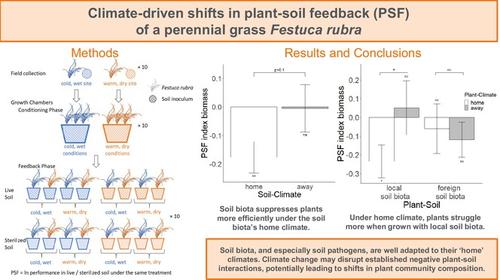Our official English website, www.x-mol.net, welcomes your
feedback! (Note: you will need to create a separate account there.)
Climate‐driven shifts in plant–soil feedback of a perennial grass species
Journal of Ecology ( IF 5.3 ) Pub Date : 2024-11-04 , DOI: 10.1111/1365-2745.14443 Anna Florianová, Zuzana Münzbergová
Plant–soil feedback (PSF) plays a key role in determining the composition of plant communities, and understanding the impact of the ongoing climate change on PSF is thus crucial for predicting the consequences of climate change for ecosystems. Here, we conducted a growth‐chamber experiment to examine possible climate‐driven shifts in PSF of a perennial grass, Festuca rubra , originating from two climatically distinct sites, by using all factorial combinations of soil biota origin, plant origin, and cultivation climate. Soil biota generated more negative PSF effects when grown under the climatic conditions of their origin. This observation suggests that soil biota, especially soil pathogens, are well adapted to their local climate, exhibiting greater efficiency in suppressing plant growth within their climatic conditions. All plants, regardless of their origin, exhibited less negative PSF (expressed as relative performance in live vs. sterilized soil) when grown under warmer climate than under colder climate, likely due to positive effects of increased activity of soil decomposers and enhanced nutrient cycling. Plants showed negative PSF when grown with local soil biota under home climate, and the negative PSF disappeared when plants were grown with foreign biota or in away climates. This suggests that any disruption of the established plant‐soil‐climate interactions may lead to the release of plants from negative PSF, potentially destabilizing plant communities. Synthesis . Our results highlight the adaptions of soil biota to their native climate as key drivers of plant–soil feedback interactions and suggest that climate change could significantly alter these interactions, potentially leading to new plant community dynamics. These findings emphasize the need for further investigations to unravel the mechanisms driving these responses and evaluate their consequences for ecosystem resilience in the face of climate change.
中文翻译:

多年生草种植物-土壤反馈的气候驱动变化
植物-土壤反馈 (PSF) 在决定植物群落的组成方面起着关键作用,因此,了解持续气候变化对 PSF 的影响对于预测气候变化对生态系统的影响至关重要。在这里,我们进行了一项生长室实验,通过使用土壤生物群起源、植物起源和栽培气候的所有因子组合,检查起源于两个气候不同地点的多年生草 Festuca rubra 的 PSF 可能由气候驱动的变化。土壤生物群在其起源的气候条件下生长时会产生更多的负面 PSF 影响。这一观察结果表明,土壤生物群,尤其是土壤病原体,很好地适应了当地的气候,在其气候条件下抑制植物生长方面表现出更高的效率。所有植物,无论其来源如何,在温暖气候下生长时,与在较冷气候下生长时相比,其负 PSF(表示为在活土与消毒土壤中的相对性能)均低于在较冷气候下生长,这可能是由于土壤分解物活性增加和养分循环增强产生的积极影响。在家庭气候下与当地土壤生物群一起生长时,植物显示出负 PSF,而当植物与外来生物群或远离气候一起生长时,负 PSF 消失。这表明,任何对已建立的植物-土壤-气候相互作用的破坏都可能导致植物从负 PSF 中释放出来,从而可能破坏植物群落的稳定。合成。我们的研究结果强调了土壤生物群落对其原生气候的适应是植物-土壤反馈相互作用的关键驱动因素,并表明气候变化可能会显着改变这些相互作用,从而可能导致新的植物群落动态。 这些发现强调需要进一步调查,以揭示驱动这些反应的机制,并评估它们在面对气候变化时对生态系统复原力的影响。
更新日期:2024-11-04
Journal of Ecology ( IF 5.3 ) Pub Date : 2024-11-04 , DOI: 10.1111/1365-2745.14443 Anna Florianová, Zuzana Münzbergová

|
中文翻译:

多年生草种植物-土壤反馈的气候驱动变化
植物-土壤反馈 (PSF) 在决定植物群落的组成方面起着关键作用,因此,了解持续气候变化对 PSF 的影响对于预测气候变化对生态系统的影响至关重要。在这里,我们进行了一项生长室实验,通过使用土壤生物群起源、植物起源和栽培气候的所有因子组合,检查起源于两个气候不同地点的多年生草 Festuca rubra 的 PSF 可能由气候驱动的变化。土壤生物群在其起源的气候条件下生长时会产生更多的负面 PSF 影响。这一观察结果表明,土壤生物群,尤其是土壤病原体,很好地适应了当地的气候,在其气候条件下抑制植物生长方面表现出更高的效率。所有植物,无论其来源如何,在温暖气候下生长时,与在较冷气候下生长时相比,其负 PSF(表示为在活土与消毒土壤中的相对性能)均低于在较冷气候下生长,这可能是由于土壤分解物活性增加和养分循环增强产生的积极影响。在家庭气候下与当地土壤生物群一起生长时,植物显示出负 PSF,而当植物与外来生物群或远离气候一起生长时,负 PSF 消失。这表明,任何对已建立的植物-土壤-气候相互作用的破坏都可能导致植物从负 PSF 中释放出来,从而可能破坏植物群落的稳定。合成。我们的研究结果强调了土壤生物群落对其原生气候的适应是植物-土壤反馈相互作用的关键驱动因素,并表明气候变化可能会显着改变这些相互作用,从而可能导致新的植物群落动态。 这些发现强调需要进一步调查,以揭示驱动这些反应的机制,并评估它们在面对气候变化时对生态系统复原力的影响。


















































 京公网安备 11010802027423号
京公网安备 11010802027423号